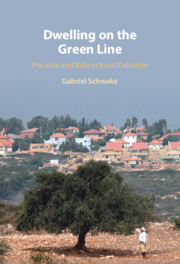Book contents
- Dwelling on the Green Line
- Dwelling on the Green Line
- Copyright page
- Epigraph
- Contents
- Figures
- Preface
- 1 Introduction
- 2 Background
- 3 (Neo-)Ruralization and the Community Settlement
- 4 Gentrification and the Suburban Settlement
- 5 Mass Suburbanization and the Stars Settlements
- 6 Financialization and Harish City
- 7 Conclusions
- Bibliography
- Index
6 - Financialization and Harish City
Merging Financial and Geopolitical Frontiers
Published online by Cambridge University Press: 23 March 2022
- Dwelling on the Green Line
- Dwelling on the Green Line
- Copyright page
- Epigraph
- Contents
- Figures
- Preface
- 1 Introduction
- 2 Background
- 3 (Neo-)Ruralization and the Community Settlement
- 4 Gentrification and the Suburban Settlement
- 5 Mass Suburbanization and the Stars Settlements
- 6 Financialization and Harish City
- 7 Conclusions
- Bibliography
- Index
Summary
This chapter focuses on the city of Harish, a project that various governments have tried to develop over the last forty years. The first attempts included a kibbutz, a Community Settlement and, later, a Suburban Settlement. All were unsuccessful, mainly due to the site’s peripheral location and proximity to the West Bank and other Arab towns. By 2010, the huge demand for new dwelling units, the construction of the Trans-Israel Highway and the recently erected West Bank Separation Barrier all contributed to turning Harish into an attractive piece of real estate. This enabled the Israeli government to designate it as a city with a target population of 60,000. Focusing on the case of Harish, this chapter illustrates the financialization of the national settlement project, explaining how the state apparatus was used to create a real-estate market in a given area to supply the dwelling units that were needed while expanding the national territorial project. Analyzing the urban layout and the housing units in Harish, as well as the everyday life of the families in it, this chapter explains how this future city embodies the privatization of the national settlement project.
- Type
- Chapter
- Information
- Dwelling on the Green LinePrivatize and Rule in Israel/Palestine, pp. 198 - 232Publisher: Cambridge University PressPrint publication year: 2022

